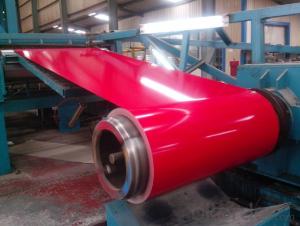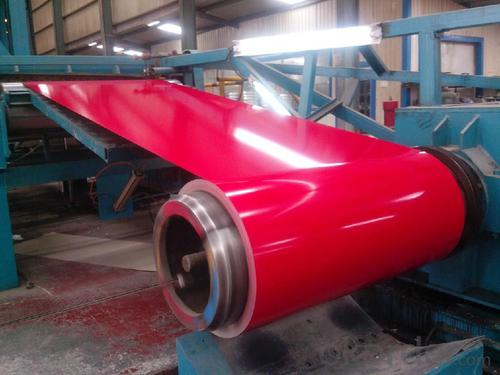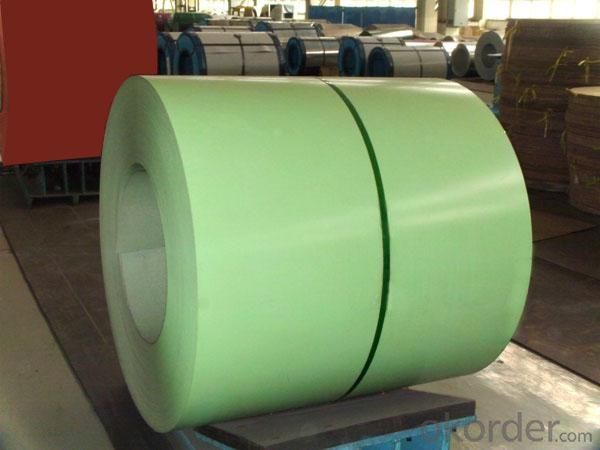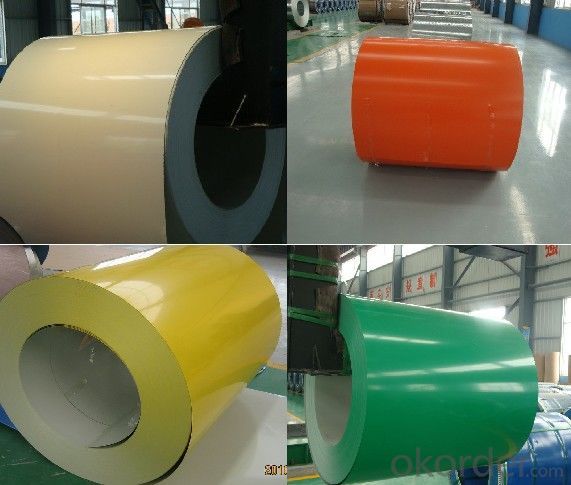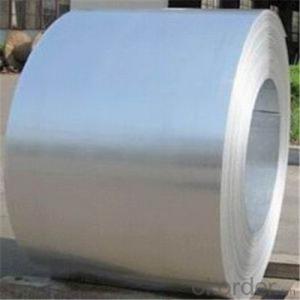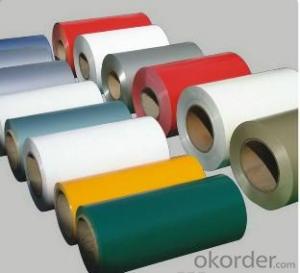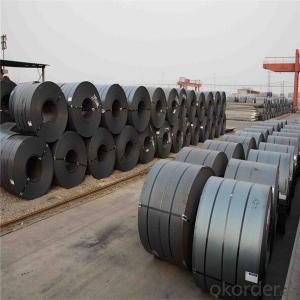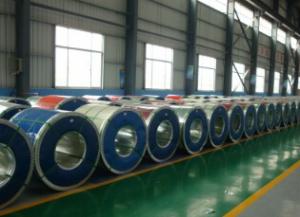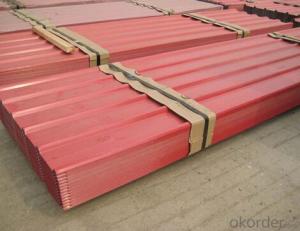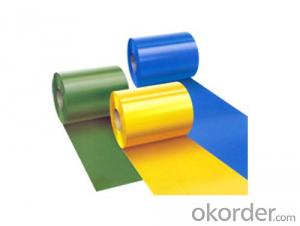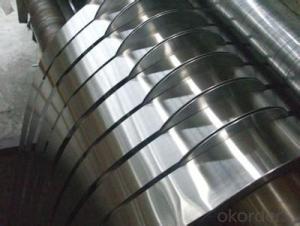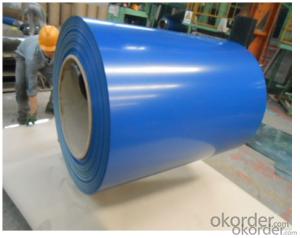Color Coated Steel Sheet 2015 Best Sell
- Loading Port:
- Qingdao
- Payment Terms:
- TT or LC
- Min Order Qty:
- 2900 PCS
- Supply Capability:
- 30000 PCS/month
OKorder Service Pledge
OKorder Financial Service
You Might Also Like
OKorder is offering high quality Color Coated Steel Sheet at great prices with worldwide shipping. Our supplier is a world-class manufacturer of steel, with our products utilized the world over. OKorder annually supplies products to European, North American and Asian markets. We provide quotations within 24 hours of receiving an inquiry and guarantee competitive prices.
Product Applications:
Color Coated Steel Sheet is ideal for general fabricating and metalworking.
Product Advantages:
OKorder's Steel Sheet is durable, resists corrosion, and are conducive to processing, such as PPGI embossing, printing, and punching.
Main Product Features:
· Premium quality
· Prompt delivery & seaworthy packing (7-30 days after receiving deposit)
· Corrosion resistance
· Professional Service
· Competitive pricing
Product Specifications:
Grade: Q195, SGCC, SGCD, SECC, SECD, DX51D+Z
Height: 90 – 400mm
Width: 600 – 1250mm
Thickness: 0.16 – 2.0mm
Length: As per customer request
Coating: 80 – 275g/m² Zn
Surface: Galvanized, zero spangle, regular spangle, normal spangle
Treatment: Chromated & oiled, chromated, non-oiled
Packaging: Standard export packing, 4 steel eye bands and 4 steel circumferential bands, galvanized metal fluted rings on inner and outer edges, galvanized metal and waterproof paper wall protection disk
FAQ:
Q1: Why buy Materials & Equipment from OKorder.com?
A1: All products offered byOKorder.com are carefully selected from China's most reliable manufacturing enterprises. Through its ISO certifications, OKorder.com adheres to the highest standards and a commitment to supply chain safety and customer satisfaction.
Q2: How do we guarantee the quality of our products?
A2: We have established an advanced quality management system which conducts strict quality tests at every step, from raw materials to the final product. At the same time, we provide extensive follow-up service assurances as required.
Q3: How soon can we receive the product after purchase?
A3: Within three days of placing an order, we will begin production. The specific shipping date is dependent upon international and government factors, but is typically 7 to 10 workdays.
Q4: What makes stainless steel stainless?
A4: Stainless steel must contain at least 10.5 % chromium. It is this element that reacts with the oxygen in the air to form a complex chrome-oxide surface layer that is invisible but strong enough to prevent further oxygen from "staining" (rusting) the surface. Higher levels of chromium and the addition of other alloying elements such as nickel and molybdenum enhance this surface layer and improve the corrosion resistance of the stainless material.
Q5: Can stainless steel rust?
A5: Stainless does not "rust" as you think of regular steel rusting with a red oxide on the surface that flakes off. If you see red rust it is probably due to some iron particles that have contaminated the surface of the stainless steel and it is these iron particles that are rusting. Look at the source of the rusting and see if you can remove it from the surface.
Images:
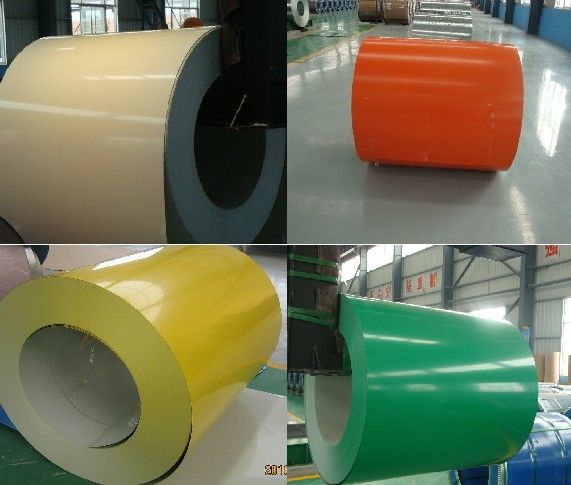
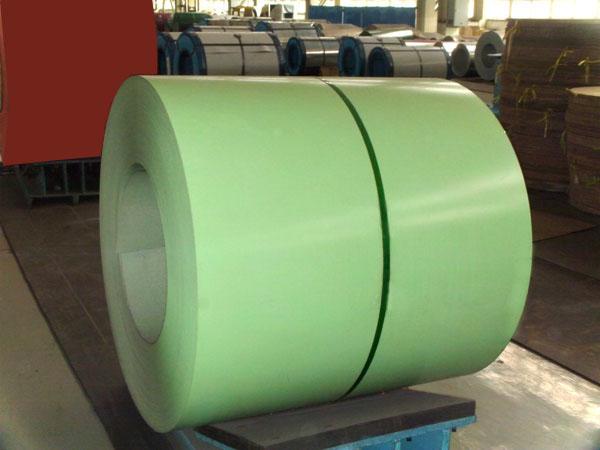
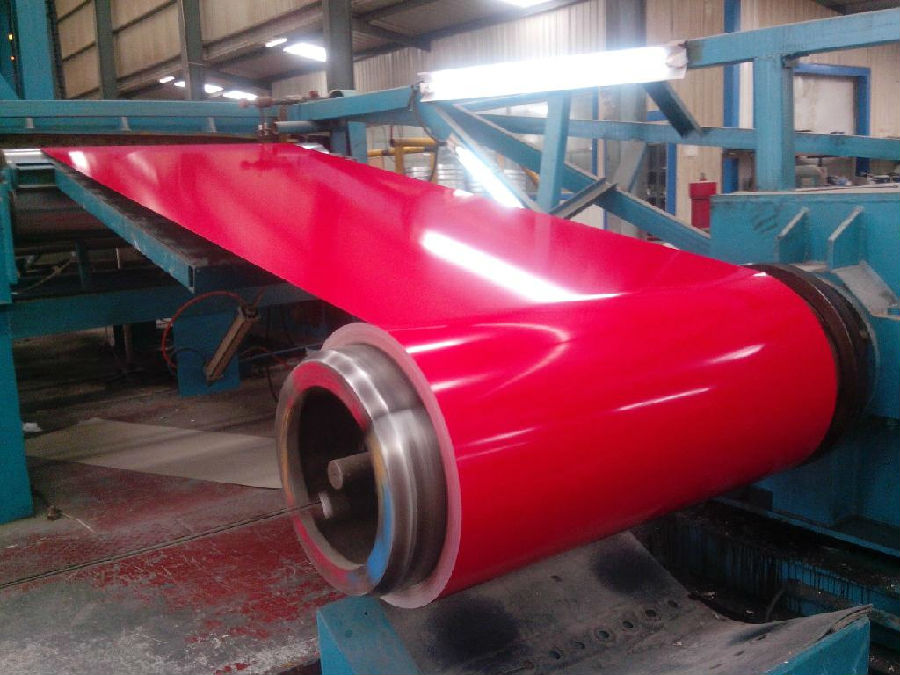
- Q: What are the safety precautions when working with steel coils?
- When working with steel coils, it is important to follow several safety precautions. Firstly, workers should wear appropriate personal protective equipment (PPE) such as gloves, safety glasses, and steel-toe boots to protect themselves from potential injuries. Additionally, they should ensure that the work area is well-lit and free from any trip hazards. Proper lifting techniques should be used to prevent strains or sprains, and workers should be trained on how to safely operate any machinery or equipment involved in handling the coils. Regular inspections of the coils, checking for any defects or damages, should also be conducted to avoid accidents. Lastly, workers should be aware of the potential hazards associated with working with steel coils, such as sharp edges, pinching points, and the risk of heavy objects falling, and take necessary precautions to minimize these risks.
- Q: What are the dimensions of a steel coil?
- The dimensions of a steel coil can vary depending on its intended use and manufacturer. However, typical dimensions include a width ranging from 600mm to 2,200mm, a diameter of 600mm to 2,000mm, and a weight ranging from a few hundred kilograms to several metric tons.
- Q: How are steel coils used in the production of industrial storage tanks?
- Industrial storage tanks commonly utilize steel coils due to their superior strength and durability. These coils are typically crafted from high-quality steel that is rolled into a coil shape, enabling convenient transportation and handling. During the production process, steel coils are initially uncoiled and flattened to create steel sheets. These sheets are then cut and formed into the desired shape and size for the storage tank. The steel sheets are joined together through welding or bolting to construct the tank's body, which is designed to endure high pressure and heavy loads. The utilization of steel coils in the production of industrial storage tanks offers numerous benefits. Firstly, the strength and durability of steel ensure that the tanks can withstand harsh conditions and resist corrosion. This is particularly vital for storage tanks containing corrosive substances or exposed to severe environments. Moreover, the flexibility of steel coils permits customization of the tank's design and size. This is especially advantageous in industries with varying storage requirements, like the oil and gas sector. Steel coils can be effortlessly cut and molded into diverse shapes and sizes, facilitating the creation of storage tanks tailored to specific storage needs. Furthermore, steel coils are easily transportable and storable, making them a cost-effective choice for industrial storage tank production. The coils can be efficiently transported to the manufacturing facility, reducing transportation costs and logistical complexities. In conclusion, steel coils play a crucial role in the production of industrial storage tanks by providing strength, durability, and customization options. Their usage guarantees the safe storage and protection of various substances, rendering them indispensable in a wide range of industries.
- Q: What is the typical size and weight of a steel coil?
- The typical size and weight of a steel coil can vary depending on its intended use and industry standards. However, a common size for a steel coil is around 36 inches in width and weighs approximately 5 to 10 tons.
- Q: What are the different types of steel coil surface finishes for aesthetics?
- There are several different types of steel coil surface finishes that are commonly used for aesthetics purposes. These finishes are applied to the surface of the steel coil to enhance its appearance and provide a desired aesthetic appeal. Some of the most popular types of steel coil surface finishes include: 1. Polished Finish: This type of finish involves using abrasive materials to create a smooth and reflective surface on the steel coil. It provides a high-gloss look and can be further enhanced by using different levels of polishing. 2. Satin Finish: Also known as brushed finish, this type of surface finish involves using a fine abrasive material to create a soft and matte appearance on the steel coil. It provides a subtle sheen and a textured effect. 3. Etched Finish: This finish involves using a chemical process to create patterns or designs on the surface of the steel coil. It can be used to create intricate and decorative designs, making it a popular choice for architectural applications. 4. Embossed Finish: This type of finish involves pressing or stamping a pattern onto the surface of the steel coil. It creates a raised design that adds texture and visual interest to the steel coil. 5. Powder Coated Finish: In this finish, a dry powder is applied to the steel coil and then heated to form a protective and decorative coating. It is available in a wide range of colors and provides a durable and vibrant finish. 6. Painted Finish: This type of finish involves applying a layer of paint to the surface of the steel coil. It allows for customization in terms of color and provides protection against corrosion and other environmental factors. These are just a few examples of the different types of steel coil surface finishes available for aesthetic purposes. Each finish offers a unique look and can be selected based on individual preferences and project requirements.
- Q: How are steel coils used in the manufacturing of safety systems?
- Steel coils are used in the manufacturing of safety systems as they serve as a key component for reinforcement and support. These coils are often used in the construction of structural elements such as beams, columns, and frames, providing strength and stability to ensure the safety and durability of the overall system. Additionally, steel coils are utilized in the production of safety equipment such as guardrails, barricades, and safety barriers, offering protection and preventing accidents in various industries and applications.
- Q: I found the cold steel kukri machete online and I am very impressed and am thinking of ordering it. A friend of mine said that the cold steel kukri machete is nothing compared to the KaBar Kukri Machete. I was wondering if other people who own these machetes could tell me the good and the bad of each machete. Such as what they have been able to cut. If they break easily and such. Thanks in advance.
- I don't know about the Kabar Kukri, but I can vouch for the Cold Steel product. Cold Steel tests all of their products in extreme conditions, check out their website and look up their free video cold proof. They do things like cut a side of beef, bones in, in half with one strike, or cut a 3 inch thick rope 1,000 times with the same knife and then still shave the hair off their arms, and also they take their knives and stab them through car doors and hang weights on them. So a Cold Steel Kukri is guaranteed to do its job well (which incidentally is used to sever heads). They usually have pretty good prices too. The only thing you need to worry about is the legality of ordering that weapon wherever you live. Cold Steel is totally legit (annoyingly so) and will not mail/sale weapons to areas that have banned the purchase and ownership of them. So good luck with your purchase!
- Q: Can steel coils be used in electrical applications?
- Yes, steel coils can be used in electrical applications. Steel coils are often used as magnetic cores in transformers and inductors, which are essential components in electrical circuits. The steel used in these coils is typically a type of high-quality electrical steel that has specific magnetic properties, such as low core losses and high permeability. These properties allow the steel coils to efficiently transfer electrical energy between different components of the circuit. Additionally, steel coils can also be used in other electrical applications, such as in the construction of electric motors and generators. Overall, steel coils are widely utilized in electrical applications due to their magnetic properties and their ability to handle high currents and temperatures.
- Q: What kind of insulation should be used in a steel building?
- Fiberglass batts or spray on foam both work well
- Q: Hi, I need to know why stainless steel is rust proof please tell me its for my science project. :)
- Stainless steel is an alloy of iron and other metals, notably Chromium and vanadium. You do not see it with the naked eye but at the surface of any stainless steel (SS) there are iron atoms and chromium atoms that are exposed. However, the chromium reacts preferentially to form an oxide. In essence, think of chromium sacrificing itself for iron so that iron will not rust. What a nice guy huh! This is called passivation just like most responders said. However, more than that the chromium oxide forms a tight protective layer that forms a physical barrier preventing Oxygen or any oxidant to reach and attack the iron underneath it. Also, the chromium oxide formed is not FLAKY and porous, so it does not mar much of the surface as an iron oxide (rust) would. For science project, you may not make it too technical but you can make a reference or make an ANALOGY of rust prevention to high school or social situations as being there for your friend or classmate But in real life, when the odds are too great, that protection afforded by chromium may not be enough. Because eventually all steel exposed to very oxidizing atmospheres will rust. Just a little break in the surface is enough to start the process of rusting.
Send your message to us
Color Coated Steel Sheet 2015 Best Sell
- Loading Port:
- Qingdao
- Payment Terms:
- TT or LC
- Min Order Qty:
- 2900 PCS
- Supply Capability:
- 30000 PCS/month
OKorder Service Pledge
OKorder Financial Service
Similar products
Hot products
Hot Searches
Related keywords
